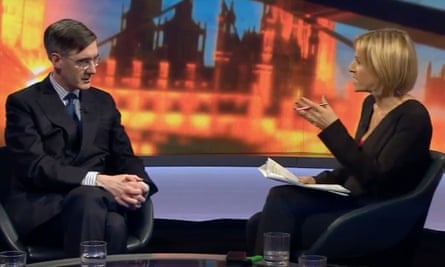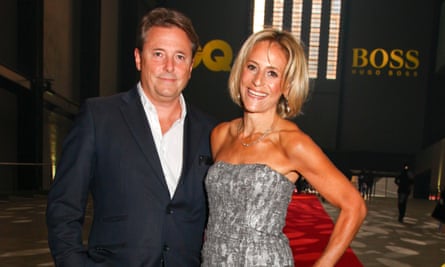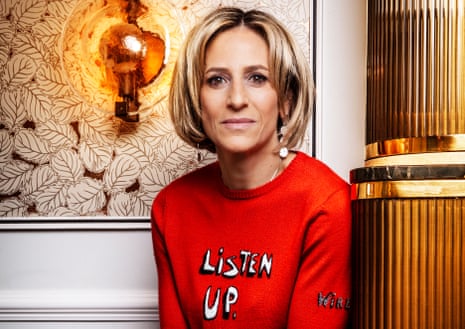In the mornings, after her sons leave for school, Emily Maitlis sets off for a run with friends. It’s a ritual that clearly matters to her, a chance to stretch both mind and body. “It sounds weird, but it’s my most sociable time of day,” she says. “I have three different groups of girlfriends and I swear to you, we put the world to rights between 8.15 and whenever we end. Some days there’s a lot of running and a bit of talking, some days there’s a lot of talking and a bit of running. But by the end I’m oxygenated and body-tired, as opposed to mind-tired.”
By this stage in the Brexit process much of Westminster is living on nerves and caffeine, and it seems Newsnight’s new lead presenter is no exception. Maitlis is a habitual insomniac, who struggles to switch off once the cameras stop rolling. She’ll drink a glass of rosé or a vodka on ice when she gets home, but then “I have to listen to the midnight news and I have to see if any of my interview lines have been picked up. So you get on this awful treadmill of ‘What’s happened now?’ Then, of course, I wake up bang on 6am, and half the time I wake up earlier, at 4am, which is all to do with having not quite worked out what to do with the excess adrenaline.” But, however tired she is, before crashing out she’ll often answer emails from viewers responding passionately (sometimes angrily) to that night’s show. “I always think, ‘Oh my God, I’m exhausted, I want vodka and bed,’ but I do it. I think: ‘Right, I’m just going to sit down and respond and I’m not going to get defensive.’
“But often I wake up the next morning to the most charming emails… Once you say, ‘Yes, it’s a shame we didn’t get Obama, but we tried and he said no’ – sometimes it just helps to spell that out in a quiet, gentle way. You sort of assume that everyone knows how television works, but they don’t actually, why should they?”
And that’s the point of her new book, Airhead, a behind-the-scenes look at how news gets made. Months of rolling political crises have made stars of the reporters beamed nightly into our living rooms to explain it, but with the fascination comes an intense suspicion about the media’s role in shaping events. This is her attempt to show that when mistakes are made, it’s generally more cock-up than conspiracy.

The title feels very Maitlis, a self-deprecatory joke from someone who has earned the right to not be patronised, but if anything the book is more self-critical. In it she pores back over old interviews, diligently noting things she wishes in retrospect she’d asked. Why didn’t she see how big the #MeToo movement would grow, or challenge Donald Trump (who was just another rich celebrity when she interviewed him) on his fibbing? But when I say she seems hard on herself, she looks surprised. “Newsnight’s one of those amazing places where you get to make a brand new mistake every night – some of them are laughable and some are faintly ridiculous and some are things where you’re beating your head against the pillow at 3am going, ‘No, no, no, why, why, why?’ I think I have tried to bring that out a bit. I quite enjoy the analysis of what went wrong. It’s not backwards-looking, it’s meant to be: ‘That went wrong, therefore next time we do this’.”
And besides, she’s fascinated by the “what ifs”, the points at which history might have turned out differently. In Budapest to report on refugees arriving from Syria and Afghanistan, she encountered a far-right protest that felt like a footnote to the story, but in retrospect was a warning. “I remember thinking at the time, ‘Oh, these are the voices – like the Ultras I describe – that are on the fringe. They are the people you have to listen to, but not…” she tails off. “And what have we seen since? We have seen a resurgent [Hungarian prime minister Viktor] Orbán, we’ve seen [Italian minister of the interior Matteo] Salvini. We’ve seen the way Europe’s moved, we have seen that voice was much more central than I realised at the time. Maybe that was my moment to understand that we might Brexit, too, but I didn’t.” In hindsight, she says, the refugee story was “being weaponised by one side before we even properly understood it”.
On that trip, Maitlis wore a gold bracelet her father had made for her from a piece of jewellery belonging to her grandmother, who fled Nazi Germany (the family are Jewish, although Maitlis has said she herself is “not very practising”). She also took clothes her own boys, Milo, 14, and Max, 12, had outgrown and distributed them to the refugee children off-camera.
As BBC reporters must, she walks a fastidiously neutral political line, but clearly she brings her own feelings and experiences to work – and never more famously than when interviewing Theresa May after the Grenfell fire. Maitlis had been at a makeshift volunteer centre on her day off, sorting donations and directing survivors to emergency accommodation. Summoned by Downing Street the next day for a brief but passionate interview, she challenged May on air to take responsibility for the tragedy and its chaotic aftermath. Did she think being emotionally involved made her a better reporter that day, or a compromised one?

“I think it made me ask the right questions,” she says. “I had people saying: ‘Emily, should we leave the hotel for our meals, are we meant to go back, can we collect our belongings?’ The stuff I wanted to ask the Prime Minister was not lofty political rhetoric, it was: ‘This is what people still don’t know.’ I think you have to believe you are a richer journalist for having understood the situation and the context better.” If the interview felt raw, she says, so did the mood on the ground. “I remember saying in the morning to somebody: ‘This feels close to the 2011 riots.’ It was hot, and it had that crackliness to it, as if it was all about to kick off. In a way, you do the interview for the moment.”
Emily Maitlis is, rather shockingly, the only presenter on Newsnight who wasn’t privately educated, but hers was a comfortably middle-class upbringing nonetheless. Her father was an academic, her mother retrained as a psychotherapist aged 60, and home in Sheffield was a place full of books where “you talked about things, but where you always got shushed when the headlines came on,” she recalls. “I can’t bear people talking in the pips, I’m like: ‘What the fuck are you doing? It’s the pips!’ My husband goes: ‘You do know you’ve been listening for two hours, they’re not going to surprise you,’ but I think Dad used to do that. Six o’clock, stop for the news.”
At Cambridge, where she read English, she loved drama and wanted to become a director, but “I was rubbish.” Instead she got a job in radio news while living in Hong Kong (where she also met her husband, investment manager Mark Gwynne). What unites news and theatre, she says, is that timing is everything. “If you interrupt somebody too early, if you miss it and don’t interrupt at all – that’s the difference between a good interview and a bad interview. It’s about the absolute moment.”
Brexit has given her plenty of those, from the now infamous eye-roll (a flicker of exasperation when Labour’s Barry Gardiner was speaking, which she didn’t even register, but which promptly went viral) to dramatic late-night votes, which have her tearing up the script. The breakdown of party discipline under the strain of Brexit is, she thinks, leading to more unpredictable interviews as politicians start saying what they really think – so much so that she has been pondering the usefulness of traditional “gotcha” interviews, at a time when MPs are openly agonising over the choices they face.

“We have to decide whether we should continually point out hypocrisy when people change their minds,” she argues. “The public are probably crying out for something that looks like compromise. So if people are compromising, do we say: ‘Ooh, you’re such a hypocrite’ or do we go, ‘Look, you are one of the problem-solvers, so what does it take to move forwards?”
Newsnight has been roundly criticised, however, for some of the edgier decisions it has made in covering the politics of extremes. Maitlis has, she insists, “absolutely no regrets” about interviewing Trump’s controversial former chief strategist Steve Bannon. “It’s quite patronising in a funny way to assume our viewers couldn’t handle something like that. People can make up their own minds, they’re smart and thoughtful and if they want to be critical of it, that’s fine. But he was part of one of the biggest electoral revolutions we have seen. To say: ‘You haven’t earned a place on BBC Newsnight’ would be ridiculous.”
It’s a classic journalistic defence – that ignoring uncomfortable realities doesn’t make them go away – but the dilemma now is that Newsnight’s films can develop a life beyond their intended audience, clipped and shared on social media by alt-right activists. Her editors’ decision to screen a film analysing the appeal of Tommy Robinson, or to invite on representatives from the group thought to have inspired the alleged Christchurch shooter, clearly angered viewers who felt it risked giving dangerous views a degree of legitimacy. Maitlis didn’t conduct either interview, but will say only that the entire team spends “an inordinate amount of time” trying to get such judgements right. “We have to take every single person on merit; it’s to do with the context, it’s to do with timing, it’s to do with balance, it’s to do with how much we challenge them. I think some of the films that Gabriel Gatehouse and Katie Razzall have done on the far right for Newsnight have taught me stuff about my country I never knew. Why on earth wouldn’t we bring that to the viewers? Of course we would, or we’d be saying, ‘This is too scary, don’t worry about it, make your cocoa and go to bed’. It’s really important that we do that and if we’re not doing that, bloody hell, who is?”
She is sceptical too about the charge that people like her are the “elite”, existing in a liberal bubble where everyone knows everyone (Piers Morgan is a good friend, she has Emma Thompson’s number in her mobile). “I think we understand that word for what it is, which is that incredibly elitist people try and gain the populist upper hand by calling everyone else elite,” she says. “There was a time when everyone was cowed by it. It was like somebody shouting: ‘You’re a racist,’ and you think, ‘Oh my God, what have I said, what have I done?’ Now I hear that word and I just – dare I say – roll my eyes. I think you have to be very careful as to who’s actually using it.”
But does she keep her distance socially from potential interviewees, or do Cabinet ministers come round for supper? She snorts. “I can’t remember the last time anybody got invited round to dinner with me. I don’t really know MPs socially.” If anything, she likes to spend her spare time decompressing. On the day we meet she’s skipping the first round of Brexit indicative votes in favour of the boys’ school musical, having learned not to be shy of putting the kids first. “I will always remember a birthday I missed, and it ended up being the worst Newsnight I’d ever done and I remember thinking, ‘Oh bugger that, why did I do that?’” she says. “So now I’ve got a no birthday rule.”
It certainly hasn’t harmed her career. After a demoralising period in which she emerged as one of many victims of the BBC’s gender pay gap – she says she’d unsuccessfully fought the disparity “years” before it became public – she now leads an all-female Newsnight line-up alongside Kirsty Wark and Emma Barnett. Cheeringly, she got the big job at 48, an age when women in TV would once have been “thrown into a cart and carried away” as she puts it.
“I just love the feeling of being more experienced in the job. It’s funny, I find the whole thing better for being older,” she says emphatically. “You’ve just seen stuff before, you can picture exactly how an interview’s going to go. I would like to think that it’s all changing, but I also think that what I offer now is what I have learned, so why would you want to get rid of that? I’ve learned stuff from covering five elections, three US elections and midterms. I’ve learned how to travel across America for three weeks in nothing but carry-on luggage and manage to hit the key moments in an extraordinary campaign trail. I think it’s important not to limit your own sense of achievement or longevity. If you go into it thinking, ‘I’m going to look shit in five years, that’s me gone’ – you’re just going to really regret it.”
The veteran Sky News presenter Kay Burley felt she needed a facelift to stay on air through her 50s, but Maitlis insists she doesn’t feel the same pressure – although she does admit to being pleased new editor Esme Wren has changed the show’s harsh lighting. “It’s not about, ‘Please put lightbulbs around my mirror,’ it’s about, ‘Respect it as a televisual medium.’ Just because we’re doing quite analytical and intense things doesn’t mean we shouldn’t be watchable and inviting and warm.”
The following night on Newsnight, she will eviscerate Jacob Rees Mogg. But for now I leave her heading off through the sunshine towards the school production of We Will Rock You, wondering about a sneaky glass of wine before curtain up.
Airhead: The Imperfect Art of Making News by Emily Maitlis is published by Penguin at £18.99. Order it for £16.71 at guardianbookshop.com
